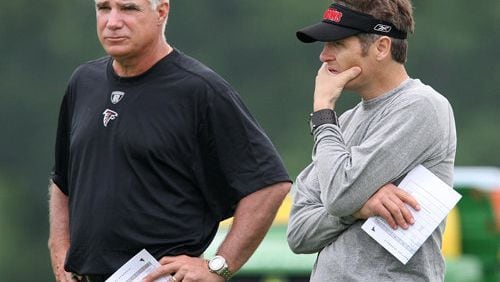FLOWERY BRANCH -- Here's the league's media release on the Free Agent period.
Teams could start talking to player representatives today. Teams can start signing players on Tuesday at 4 p.m.
Vote in our poll on who the Falcons should sign.
Here are five possible free agent targets for the Falcons.
2014 NFL FREE AGENCY QUESTIONS & ANSWERS
SALARY CAP SET AT $133,000,000
Q. When does the 2014 free agency signing period begin?
A. At 4:00 p.m. ET on Tuesday, March 11.
Q. What is permitted during the three-day negotiating period prior to the start of free agency?
A. Beginning at 12:00 noon ET on Saturday, March 8 and ending at 3:59:59 p.m. ET on Tuesday, March 11, clubs are permitted to contact, and enter into negotiations with, the certified agents of players who will become Unrestricted Free Agents upon the expiration of their 2013 player contracts at 4:00 p.m. ET on March 11. However, a contract cannot be executed with a new club until 4:00 p.m. ET on March 11.
During this negotiation period, a prospective unrestricted free agent cannot visit a club (other than the player’s current club) at its permanent facility or at any other location, and no direct contact is permitted between the player and any employee or representative of a club (other than the player’s current club). If a player is self-represented, clubs are prohibited from discussions with the player during the negotiating period.
Clubs (other than the player’s current club) may not discuss or make any travel arrangements with prospective unrestricted free agent players, their certified agents, or anyone else associated with the player until the expiration of those players’ 2013 Player Contracts at 4:00 p.m. ET on March 11.
The three-day negotiating period applies only to potential unrestricted free agents; it does not apply to players who are potential Exclusive Rights Players or Restricted Free Agents, or to players who have been designated as Franchise Players or Transition Players.
Q. What are the categories of free agency?
A. Players are either "Restricted Free Agents" or "Unrestricted Free Agents." A Restricted Free Agent may be subject to a qualifying offer. A Restricted or Unrestricted Free Agent may be designated by his prior club as its Franchise Player or Transition Player.
Q. What is the time period for free agency signings this year?
A. For Restricted Free Agents, from March 11 to May 2. For Unrestricted Free Agents who have received the June 1 tender from their prior club, from March 11 to July 22 (or the first scheduled day of the first NFL training camp, whichever is later). For Franchise Players, from March 11 until the Tuesday following the 10th week of the regular season, November 11. For Transition Players, from March 11 until July 22. If the above-listed players do not sign by November 11, they must sit out the season.
Q. What is the difference between a Restricted Free Agent and an Unrestricted Free Agent?
A. In the 2014 League Year, players with three accrued seasons become Restricted Free Agents when their contracts expire at the conclusion of the 2013 League Year. Unrestricted Free Agents have completed four or more accrued seasons. An Unrestricted Free Agent is free to sign with any club with no draft choice compensation owed to his old club.
Q. What constitutes an “Accrued Season”?
A. Six or more regular-season games on a club's active/inactive, reserved/injured or reserve/physically unable to perform lists.
Q. What could restrict the ability of a Restricted Free Agent to sign with a new club?
A. If he has received a "qualifying offer" (a salary tender predetermined by the Collective Bargaining Agreement between the league and its players) from his old club. He can negotiate with any club through May 2. If the Restricted Free Agent signs an offer sheet with a new club, his old club can match the offer and retain him because the qualifying offer entitles it to a "right of first refusal" on any offer sheet the player signs. If the old club does not match the offer, it may receive draft choice compensation depending on the amount of its qualifying offer. If an offer sheet is not executed on or before May 2, the player's negotiating rights revert exclusively to his old club. In addition, a player who would otherwise be a Restricted Free Agent may be designated by his old club as its Franchise Player or Transition Player. No Restricted Free Agents were designated as Franchise or Transition players this year.
Q. What determines an Unrestricted Free Agent?
A. A player with four or more accrued seasons whose contract has expired. He is free to sign with any club, with no draft choice compensation owed to his old club, through July 22 (or the first scheduled day of the first NFL training camp, whichever is later). At that point, his negotiating rights revert exclusively to his old club if by June 1 the old club tendered the player a one-year contract for 110 percent of his prior year's salary. His old club then has until the Tuesday following the 10th week of the regular season (November 11) to sign him. If he does not sign by that date, he must sit out the season. If no tender is offered by June 1, the player can be signed by any club at any time throughout the season.
Q. What determines a Franchise Player?
A. The salary offer by a player's club determines what type of franchise player he is: exclusive or non-exclusive.
An “exclusive” Franchise Player – not free to sign with another club – is offered the greater of (i) the average of the top five salaries at the player’s position for the current year as of the end of the restricted free agent signing period on May 2; or (ii) the amount of the required tender for a non-exclusive franchise player, as explained below.
Article 10, Section 2(a)(i) of the CBA sets forth the methodology, known as the “Cap Percentage Average,” for calculating the required tender for such a player:
The Nonexclusive Franchise Tender shall be a one year NFL Player Contract for (A) the average of the five largest Prior Year Salaries for players at the position . . . at which the Franchise Player participated in the most plays during the prior League Year, which average shall be calculated by: (1) summing the amounts of the Franchise Tags for players at that position for the five preceding League Years; (2) dividing the resulting amount by the sum of the Salary Caps for the five preceding League Years . . . ; and (3) multiplying the resulting percentage by the Salary Cap for the upcoming League Year . . . (the "Cap Percentage Average") . . . ; or (B) 120% of his Prior Year Salary, whichever is greater . . . .
If a club extends a required tender to a “non-exclusive” Franchise Player pursuant to this section, the player shall be permitted to negotiate a player contract with any club, except that draft choice compensation of two first-round draft selections shall be made in the event he signs with a new club.
Q. How many Franchise Players and Transition Players can a team designate each season?
A. A club can designate one "Franchise" Player or one "Transition" Player among its potential restricted or unrestricted free agents.
Q. Can a club decide to withdraw its Franchise or Transition designations on a player?
A. Yes. A club can withdraw its Franchise or Transition designation, and the player then automatically becomes an unrestricted free agent, either immediately or when his contract expires.
Q. What is the salary cap for 2014?
A. The salary cap is $133,000,000 per club.
Q. When must teams be in compliance with the cap?
A. At the start of the 2014 League Year, which begins at 4:00 p.m. ET on March 11.
Q. If a team is under the salary cap at the end of a given season, can the team carry over room to the next season?
A. Yes. A team may "carry over" room from one League Year to the following League Year by submitting notice to the NFL prior to 4:00 p.m. ET on the day before the team's final regular-season game indicating the maximum amount of room that the club wishes to carry over.
Q. What is the maximum amount of room that a club can carry over?
A. One hundred percent of its remaining room.







